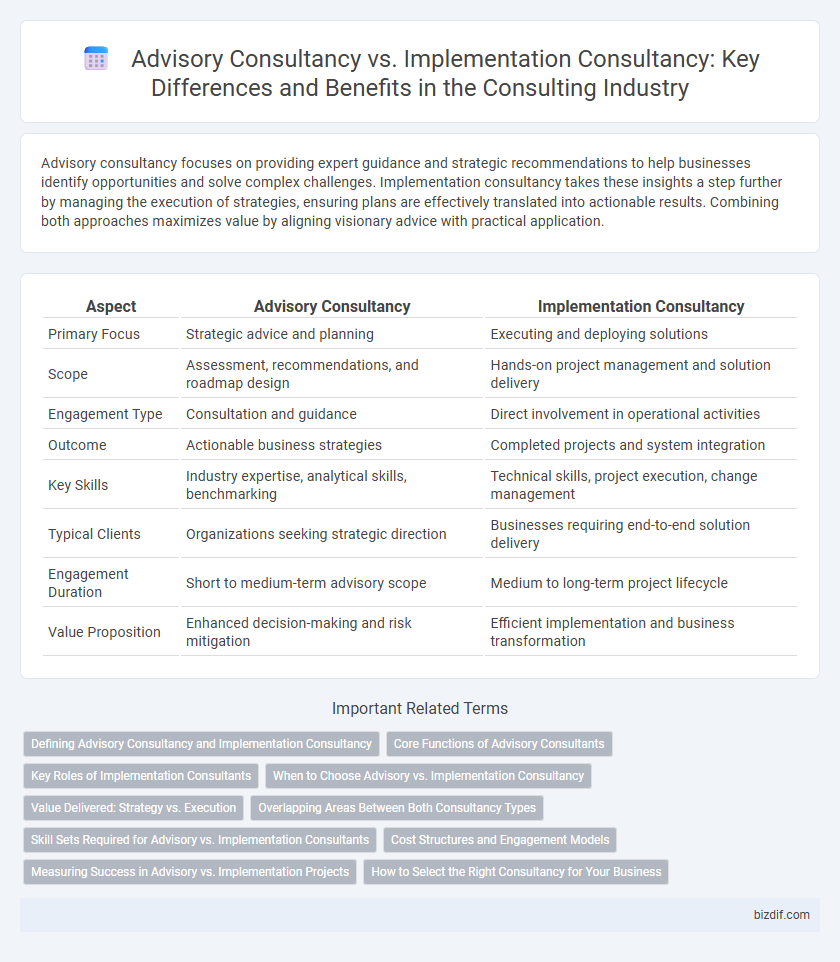Advisory consultancy focuses on providing expert guidance and strategic recommendations to help businesses identify opportunities and solve complex challenges. Implementation consultancy takes these insights a step further by managing the execution of strategies, ensuring plans are effectively translated into actionable results. Combining both approaches maximizes value by aligning visionary advice with practical application.
Table of Comparison
| Aspect | Advisory Consultancy | Implementation Consultancy |
|---|---|---|
| Primary Focus | Strategic advice and planning | Executing and deploying solutions |
| Scope | Assessment, recommendations, and roadmap design | Hands-on project management and solution delivery |
| Engagement Type | Consultation and guidance | Direct involvement in operational activities |
| Outcome | Actionable business strategies | Completed projects and system integration |
| Key Skills | Industry expertise, analytical skills, benchmarking | Technical skills, project execution, change management |
| Typical Clients | Organizations seeking strategic direction | Businesses requiring end-to-end solution delivery |
| Engagement Duration | Short to medium-term advisory scope | Medium to long-term project lifecycle |
| Value Proposition | Enhanced decision-making and risk mitigation | Efficient implementation and business transformation |
Defining Advisory Consultancy and Implementation Consultancy
Advisory consultancy focuses on providing expert guidance, strategic insights, and problem-solving advice to help organizations make informed decisions and plan effectively. Implementation consultancy involves executing the strategies and plans recommended by advisory consultants, managing projects, and ensuring practical application of solutions within the business environment. Both consultancy types are essential for achieving organizational goals, with advisory shaping the direction and implementation driving tangible results.
Core Functions of Advisory Consultants
Advisory consultancy primarily focuses on strategic analysis, providing expert recommendations, and facilitating decision-making processes to optimize business performance. Core functions include market research, risk assessment, and developing tailored strategies that align with organizational objectives. Unlike implementation consultancy, advisory consultants emphasize planning and guidance rather than executing operational tasks.
Key Roles of Implementation Consultants
Implementation consultants specialize in translating strategic plans into actionable processes by managing project execution, coordinating cross-functional teams, and ensuring technology integration aligns with business goals. Their expertise encompasses change management, risk mitigation, and performance monitoring to guarantee seamless deployment and operational adoption. They serve as critical liaisons between stakeholders and technical personnel, driving measurable outcomes through hands-on involvement and continuous optimization.
When to Choose Advisory vs. Implementation Consultancy
Advisory consultancy is best suited for organizations seeking expert guidance on strategy, risk assessment, and business transformation without immediate operational changes, often during the planning or decision-making phase. Implementation consultancy becomes essential when companies need hands-on support to execute strategies, integrate systems, or manage change within their operational processes. Choosing advisory or implementation consultancy depends on whether the priority is to gain insights and recommendations or to ensure the successful application and realization of those recommendations through practical action.
Value Delivered: Strategy vs. Execution
Advisory consultancy delivers value by providing strategic insights, market analysis, and high-level recommendations that align with long-term business objectives, enabling informed decision-making. Implementation consultancy focuses on executing these strategies through project management, operational improvements, and technology integration to achieve tangible business outcomes and measurable performance improvement. The combination of both maximizes organizational value by bridging visionary planning with practical execution.
Overlapping Areas Between Both Consultancy Types
Advisory consultancy and implementation consultancy both require deep industry expertise to address complex business challenges and deliver strategic solutions. Overlapping areas include project management, stakeholder communication, risk assessment, and aligning technology with business objectives to ensure seamless transition from strategy formulation to execution. Effective collaboration between advisory and implementation consultants enhances overall project success by integrating high-level planning with practical deployment expertise.
Skill Sets Required for Advisory vs. Implementation Consultants
Advisory consultancy demands strategic thinking, industry expertise, and strong analytical skills to diagnose business challenges and recommend actionable solutions. Implementation consultancy requires hands-on technical skills, project management abilities, and practical experience with tools and methodologies to execute and embed strategies effectively. The skill sets diverge as advisory consultants focus on insight generation and decision support, while implementation consultants prioritize operational execution and change management.
Cost Structures and Engagement Models
Advisory consultancy typically operates on a time-and-materials or retainer fee structure, focusing on strategic guidance and high-level recommendations, whereas implementation consultancy often involves fixed-price or milestone-based contracts aligned with delivering tangible project outcomes. Engagement models in advisory consultancy emphasize expert consultation and iterative feedback sessions, while implementation consultancy requires more hands-on involvement through phased project execution and resource allocation. Understanding these distinctions helps organizations optimize budget allocation and select consultancy services that align with their strategic objectives and operational timelines.
Measuring Success in Advisory vs. Implementation Projects
Measuring success in advisory consultancy projects often centers on qualitative outcomes such as strategic alignment, stakeholder satisfaction, and the clarity of recommendations provided. Implementation consultancy success is quantified by tangible metrics like project completion time, budget adherence, and the achievement of predefined operational goals. Key performance indicators (KPIs) differ significantly between the two, with advisory focusing on decision impact and implementation emphasizing execution efficiency.
How to Select the Right Consultancy for Your Business
Choosing the right consultancy requires assessing your business needs--advisory consultancies offer strategic guidance and expert analysis, while implementation consultancies focus on executing solutions and managing change. Evaluate your company's internal capabilities, project complexity, and desired outcomes to determine whether strategic advice or hands-on support is more critical. Prioritize consultancies with proven industry experience, measurable success metrics, and a collaborative approach aligned with your business goals.
Advisory Consultancy vs Implementation Consultancy Infographic

 bizdif.com
bizdif.com